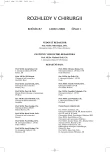Postoperative Nutritional Support in Liver Surgery. Effects of Specialized Parenteral Nutrition Enriched with Branched-Chain Amino Acids Following Liver Resections for Colorectal Carcinoma Metastases
Authors:
F. Vyhnánek 1; V. Ducháč 1; I. Vyhnánková 2; P. Skála 1
Authors‘ workplace:
Chirurgická klinika Fakutní nemocnice Královské Vinohrady a 3. lékařské fakulty Univerzity Karlovy
v Praze, přednosta: doc. MUDr. J. Fanta, DrSc.
1; II. interní klinika Fakultní Thomayerova nemocnice v Praze, přednosta: prim. MUDr. P. Beneš, CSc.
2
Published in:
Rozhl. Chir., 2008, roč. 87, č. 1, s. 21-25.
Category:
Monothematic special - Original
Overview
Introduction:
Perioperative nutritional support in liver surgery remains specific regarding the role of the liver in the metabolism regulation. The loss of functional liver tissue following resection procedures may result in significant metabolic disorders, particularly in patients with preoperative liver impairment in chronic conditions. Perioperative nutritional support is indicated in patients suffering from malnutrition, chronic liver disorders and also following liver resections with limiting residual parenchyma.
Aim of the Study:
The retrospective study assessed the effect of complete parenteral nutrition enriched with branched –chain amino acids on liver function and the rate of postoperative complications following liver resections (of at least two segments) for colorectal carcinoma metastases.
Subjects and Methodology:
142 subjects following liver resections for colorectal carcinoma metastases were included in the study. In 42 subjects with anatomical resections of at least two segments, complete parenteral nutrition enriched with branched - chain amino acids (3.8 g) was administered postoperatively from Day 1. The parenteral nutrition was maintained for 5 to 7 days, from Day 3, additional oral diet regime was indicated. In 100 subjects with a single segment resections or wedge resections, a combination of glucose 10% and crystalloid solutions was administered from Day 1, and early oral diet was added from Day2. Liver tests were performed during the first postoperative week and protein electrophoresis 14 days postoperatively.
Results:
During the first postoperative week, the liver test values reached normal values in patients with specialized complete parenteral nutrition. In subjects, where the specialized parenteral nutrition was not administered, increased alcaline phosphatase levels and gamma glutamyl transpherase levels were recorded through the postoperative Day 7. No significant differences were detected in protein electrophoresis values and in rates of postoperative complications (14 % in both patient groups). Liver test values in specialized nutritional support patients were negatively affected by the extent of their liver resections and occurrence of additional extra hepatic disorders. Administration of complete parenteral nutrition enriched with branched - chain amino acids proved a positive effect on the liver test values recovery.
Conclusion:
Postoperative parenteral nutrition with solutions enriched with branched-chain amino acids in major liver resections (at least 2 segments) has a positive impact on the liver test values recovery during the early postoperative period.
Key words :
liver resection – specialized parenteral nutrition with branched - chain amino acids
Sources
1. Brown, M. L., Fong, Y., Helton, W. S. Preoperative and postoperative nutrition in hepatobiliary surgery. In: Blumgart, L. H.: Surgery of the liver, bilary tract, and pancreas. Saunders Elsevier, Philadelphia, 2007, s. 375–385.
2. Ferrero, A., Viganó, L., Polastri, R., et al. Postoperative liver dysfunction and future remnant liver: where is the limit? World J. Surg., 2007, 31, s. 1643–1651.
3. Meng, W. C. S., Leung, K. L., Ho, R. L. K., et al. Prospective randomized control study on effects of branched-chain amino acids in patients with liver resection for hepatocellular carcinoma. Aust. N. Z. J. Surg., 1999, 69, s. 811–815.
4. Poon, R. T. P., Fan, S. T. Perioperative nutritional support in liver surgery. Nutrition, 2000, 16, s. 75–76.
5. Ryska, M., Bělina, F., Kučera, M. Velké resekce jater. Bull HPB, 2006, 14, s. 9–14.
6. Togo, S., Tanaka, K., Morioka, D., et al. Usefulness of granual BCAA after hepatectomy for liver cancer complicated with liver cirrhosis. Nutrition, 2005, 21, s. 480–486.
7. Voigt, L., Sigal, S. H., Halpern, N. A. Perioperative critical care in hepatobiliary surgery. In: Blumgart, L. H.: Surgery of the liver, biliary tract and pancreas. Saunders Elsevier, Philadelphia, 2007, s. 397–403.
8. Vyhnánková, I. Hypoglykemie u jaterního poškození. Bull HPB, 2005, 13.
9. Ziegler, T. R. Perioperative nutritional support in patiens undergoing hepatectomy for hepatocellular carcinoma. J. Parenter. Enteral. Nutr., 1966, 20, s. 91–92.
Labels
Surgery Orthopaedics Trauma surgeryArticle was published in
Perspectives in Surgery

2008 Issue 1
- Possibilities of Using Metamizole in the Treatment of Acute Primary Headaches
- Metamizole vs. Tramadol in Postoperative Analgesia
- Metamizole at a Glance and in Practice – Effective Non-Opioid Analgesic for All Ages
-
All articles in this issue
- Variations of Primary Spontaneous Pneumothorax Management
- Colorectal Carcinoma as a Cause of Acute Abdominal Illness
- Diagnostics of Intestinal Ischemia. Influence of Surgery on Plasma Levels of I-FABP as the Marker of Enterocyte Injury
- Postoperative Nutritional Support in Liver Surgery. Effects of Specialized Parenteral Nutrition Enriched with Branched-Chain Amino Acids Following Liver Resections for Colorectal Carcinoma Metastases
- Implementation of POSSUM Scoring System in Assessing Morbidity after Laparoscopic Colorectal Surgery
- K-ras Mutation as a Prognostic Factor in Colorectal Carcinoma
- Periampullary Gangliocytic Paraganglioma
- New Options for Management of Posttraumatic Articular Cartilage Defects
- Polytraumas in Injured Patients over 65 Years of Age
- Dual Kidney Transplantation
- Perspectives in Surgery
- Journal archive
- Current issue
- About the journal
Most read in this issue
- New Options for Management of Posttraumatic Articular Cartilage Defects
- Diagnostics of Intestinal Ischemia. Influence of Surgery on Plasma Levels of I-FABP as the Marker of Enterocyte Injury
- K-ras Mutation as a Prognostic Factor in Colorectal Carcinoma
- Variations of Primary Spontaneous Pneumothorax Management
